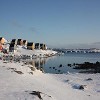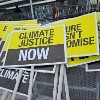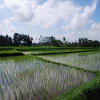Research projects
NUNATARYUK
The main goal of Nunataryuk is to determine the impacts of thawing land, coast and subsea permafrost on the global climate and on humans in the Arctic and to develop targeted and co-designed adaptation and mitigation strategies. More
SeBS
The Sentinel satellites are the space-observing part of the Copernicus system. Data coming from the Sentinels is used to deliver Copernicus Services as well as being used by companies to deliver products and services. In this project, we are concerned with products and services which use some data coming from Sentinel satellites and analyze their impact and value to society and the citizen. More
EconTrans
EconTrans takes an innovative integrated approach to address challenges that are deeply interlinked: reducing greenhouse gas (GHG) emissions, achieving the Sustainable Development Goals (SDGs), and coping with fundamental transformations triggered by disruptive technologies. The spatial focus of EconTrans is on Austria, while its emissions perspective and policy embedding is globally consistent. More
Climate resilient policy-led bioeconomy pathways (BIOCLIMAPATHS)
The EU is in the process of developing and implementing bioeconomy strategies to foster the transition from a fossil fuel-based to a renewable, biobased economy. Filling in a major knowledge gap, BIOCLIMAPATHS project develops the first interdisciplinary methodological framework that contains the whole logic flow of the knowledge development process. More
Agent-based models to inform economic policies on migration (ABM2Policy)
Unanticipated migration inflows can have positive and negative economic and social consequences depending on policies implemented by the recipient country to cope with the manifold challenges. Model-based scientific assessments of in-migration on a country's national economy are hence needed, as is meaningful stakeholder deliberation of alternative policies to support the integration of refugees in ways that contribute to resilient and sustainable societies. More
An empirical analysis of environmental inequality in the EU (EnvIneqEU)
For over thirty years, environmental justice has been a thriving research field in the United States. However, until recently, similar research has neither been conducted for most European countries nor for the European Union as a whole. More
Simulating the environmental and socio-economic effects of shared autonomous electric vehicles: the case of Vienna (SIMSAEV)
The transport sector has accounted for 28% of the CO2 emissions in Austria in 2015, more than half of which are due to passenger cars. Unlike most other sectors, emissions from the transport sector are still increasing. In order to fulfil the ambitious goals set by the Paris Agreement and to act in line with the sustainable development goals (SDGs), these emissions will have to be reduced substantially. More
Scaling-up green finance to achieve the climate and energy targets (GreenFin)
The Austrian government launched its climate and energy strategy in 2018 aimed at decarbonizing production and consumption and creating opportunities for green growth. Recent research shows that Austria is facing the challenge of aligning its greenhouse gases (GHG) emissions to the EU2030 targets and a green investment gap has to be filled. There is an urgent need to understand the conditions for an effective scaling-up of green finance in the Austrian economy and financial market, while avoiding trade-offs for economic competitiveness and financial stability. More
Global LandScapes: RFS-IIASA Rapid Spatial Analysis
The Global LandScapes project is funded by The Nature Conservancy (TNC) in the US and has the overall objective of developing a joint methodology and database to compute a map of global foodscapes and their development potential in view of planning for large-scale deployment of Nature based solutions (NBS). More
Plant-FATE
The EU-funded Plant-FATE project intends to determine the plant traits that confer drought-resistance. The aim is to accurately predict and identify species and geographical areas vulnerable to climate change. More
ERM: Medium Complexity Earth System Risk Management
The ambition of ERM is to push stylized Integrated Assessment Models (IAMs) to a higher level of applicability so as to inform the real-world policy process related to climate change. More
PETRA: The Role of Persistence in Tackling Austria’s Climate Target – Policies for The Transport Sector
The Austrian transport sector is crucially governed by “systemic delays”, caused by long-lasting infrastructure and vehicle stocks in operation for multiple years. In PETRA, these characteristics are linked with policies that had a succinct impact on the transport sector in the past to improve evaluating the delay and effectiveness of future policies. More

PUBLICATIONS

















